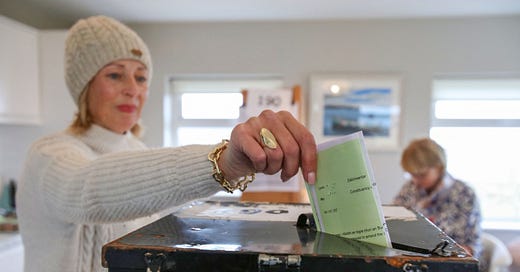Source : https://libre-media.com/articles/les-irlandais-disent-non-a-une-definition-woke-de-la-famille
By Francis Denis | News
Saturday March 9, 2024, at 11:45 a.m.
The Irish rejected by referendum proposals reflecting a woke vision of the family and of women, which they wanted to replace in a constitutional article with “member of a family”. The report by Francis Denis.
The Republic of Ireland held two constitutional referendums yesterday, March 8. Two amendments, relating to the themes of family and health care, were proposed to the Irish.
The leader of the coalition government, Taoiseach Leo Varadkar, was seeking approval from a majority of the population in favor of the changes. It was therefore through two separate votes that the Irish were able to express themselves on these social issues, thus refusing the modification of two sections of article 41.
Redefine the notion of family?
The Irish were called to express themselves on the definition of the very concept of family presented as being the logical evolution of the decision of previous referendums, which legalized homosexual marriage in 2015 and abortion in 2018.
Until now, the Irish Constitution recognizes only one family model, that inherited from Western tradition. More specifically, the Irish voted against modifying the following two paragraphs:
Article 41.1.1:
“The State recognizes the family as the primary and fundamental natural unit of society and as a moral institution possessing inalienable and imprescriptible rights, prior to and superior to any positive right.”
Article 41.3.1°:
“The State undertakes to watch with particular care over the institution of marriage, on which the family is founded, and to protect against any attack.
By voting NO, the Irish have therefore, this time, refused to include in the Constitution recent societal developments presented as beneficial. They recognize as valid the current provision recognizing the centrality of the family unit in society as well as the obligation for the State to protect the family based on marriage.
By a majority whose final figures are still awaited, the Irish have decided not to redefine the notion of family in favor of the expression "other lasting relationships", that is to say those of "persons, without distinction with regard to the sex of the partners.
During the campaign, several observers denounced the imprecision and malleability of these new formulations. Through this democratic refusal, Ireland will maintain the current definitions in full.
For former Minister of Justice Michael McDowell, this constitutional status quo is an important victory for the viability of the Irish legal system, which would have been weakened by “legal chaos in terms of inheritance and immigration laws”.
“Woman”, a controversial word?
The second question asked of the Irish public concerned the removal of two sections of Article 41 of the constitution and the addition of a new section.
Article 41.2.1°: “In particular, the State recognizes that through her life within the home, women provide the State with support without which the common good cannot be achieved.”
Article 41.2.2°: “The State therefore strives to ensure that mothers are not forced by economic necessity to engage in work to the detriment of their duties at home.”
To replace it with a new section 42B according to which:
“The State recognizes that the care given by members of a family to one another, because of the bonds which exist between them, provides to society a support without which the common good cannot be achieved, and it strives to support this care.
It was therefore on International Women's Day that a majority of Irish people opposed this second proposal for constitutional change.
Dublin will therefore have to implement this refusal to replace the word “woman” with “members of a family with each other because of the ties that unite them”.
Thus, the Irish government will have to maintain the specific recognition of the role of women as "support of the State", which will in return continue to support them through specific aid "to mothers" whose "home duties" are always recognized as priorities for the “common good” of society. The referendum will therefore result in these articles remaining unchanged.
For Councilor Sarah O’Reilly of the Aontú Party, this decision represents a huge victory since it will maintain the rights of caregivers. This amendment would have “relieved the government of its responsibility to provide care,” she said in an interview.
For Equality Minister Roderic O'Gorman, who described the old constitutional articles as "retrograde" and "without regard for the role that women play in modern Ireland", this decision marks a break with the long history of the feminist struggle against the provision of “the woman at home”.
Like any constitutional change, the changes made will take years to manifest their full extent.
Note that since its promulgation in 1937, the Irish Constitution has been subject to modifications following 38 referendums and several judgments of the Supreme Court.






Three woke guys walked into a building. You would think one of the would have noticed.
Make woke jokes and make wokeness uncool. Blonde jokes may be repurposed for this. Ridicule is our most weapon,